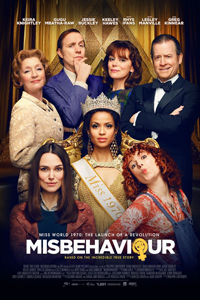Through Beauty, Equality: Lowthorpe Examines Intersections Through Provocative Period Nexus
 Sporting material speckled with enough players and perspectives to justify a much longer format, Philippa Lowthorpe manages to whittle a flurry of significant ideations into cohesiveness with her sophomore film Misbehavior.
Sporting material speckled with enough players and perspectives to justify a much longer format, Philippa Lowthorpe manages to whittle a flurry of significant ideations into cohesiveness with her sophomore film Misbehavior.
Celebrated for her work in British television, having won two BAFTAs, she resurrects the birth of the Women’s Liberation movement in the UK with the televised disruption of the Miss World pageant in 1970. The world was indeed watching as a group of feminists stormed the stage, flabbergasting the womanizing host Bob Hope and distracting from various other issues plaguing this particular ceremony (the presence of two contestants from South Africa, a country the pageant was urged to disqualify due to apartheid, and the first Black woman to win the contest, Miss Grenada, stained by rumors of a fixed jury). While dependent on a few too many clichés and blunt conversations to nail the important intersections of race and gender at play in this scenario, the script from Rebecca Frayn and Gaby Chiappe (Their Finest, 2016) otherwise manages to present a handful of characters with eloquence and grace.
Much of the behind-the-scenes finessing is hopeful conjecture, such as the chance meeting between Mbatha-Raw and Knightly in the bathroom right before the latter is about to be escorted off the premises by police. But it’s where the film addresses the elephant in the room, the difficulty the Women’s Liberation movement faced, at least partially, in its exclusivity for white voices.
The win of Miss Grenada should have been cause for celebration, and though Lowthorpe skirts around the additional issues of critique which plagued her win, it’s a symbolic progression towards the equality of beauty—that being said, this pageant and others like it are also designed to uphold women’s place in society as subservient baubles. Gugu Mbatha-Raw is captivating as the Caribbean beauty queen, exuding a poignant serenity in her performance. Knightley, as usual, doesn’t disappoint, even though her characterization bears similarity to something like the recent Official Secrets (2019).
Greg Kinnear and Lesley Manville as Bob Hope and his wife Dolores are also entertaining, especially the latter, sincerely elevating what could have easily been a shrewish role of a maligned, aging trophy wife. For every clunky detail, like using Aretha Franklin’s Respect after a resounding speech to collegiate women, there are a handful of meaningful moments, like Mbatha-Raw’s sharp intake of surprise at her win just after Loreece Harrison’s Black contestant from South Africa took the second place title, one of several reminders of the power and importance of representation no matter the time, no matter the platform.
★★★½/☆☆☆☆☆


